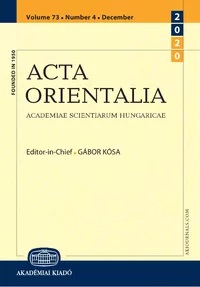Philosophy of Grammar in Ancient India: Reinterpreting the Gārgya Controversy in Nirukta 1.12–1.14
Philosophy of Grammar in Ancient India: Reinterpreting the Gārgya Controversy in Nirukta 1.12–1.14
Author(s): Paolo VisigalliSubject(s): Indian Philosophy
Published by: Akadémiai Kiadó
Keywords: etymology; Gārgya; grammar; Nirukta; Śākaṭāyana; Yāska
Summary/Abstract: This paper offers a systematic reinterpretation of the Gārgya controversy, a remarkable episode in the history of early India’s reflections on language. Recorded in Yāska’s Nirukta, this controversy centers on the issue whether all or only certain nouns are ‘born from’ (i.e., derived from) verbs. While Śākaṭāyana and the etymologists, including Yāska, believe that all nouns are derivable, Gārgya and the grammarians maintain that only morphologically regular nouns are derivable. This paper examines the arguments developed in this controversy and argues that Yāska’s belief that all nouns are derivable is not only a linguistic axiom but also reflects non-linguistic concerns pertaining to the raison d’être assigned to the discipline of etymology and to the belief that the Veda transcends history.
Journal: Acta Orientalia Academiae Scientiarum Hungaricae
- Issue Year: 76/2023
- Issue No: 2
- Page Range: 169-192
- Page Count: 24
- Language: English
- Content File-PDF

